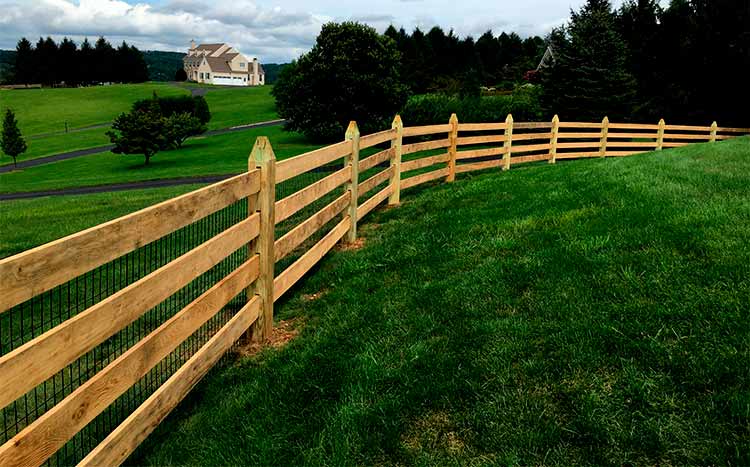Putting up a fence around your farm is essential for securing your livestock, and preventing the intrusion of undesired animals and unauthorized visitors. A range of effective options exists, each customizable to suit your specific requirements and financial limits. For those seeking help with budgeting and aiming to make well-informed choices regarding agricultural fencing, explore this straightforward and beneficial guide.
A ranch fence costs between $3,000 to $16,000 per 1000 linear feet. Expect to spend a total of $3 per linear foot on the lower side and $16 per linear foot on the upper end.
What we cover
ToggleThe Cost of Ranch Fencing by Type
The materials or type of ranch fence you choose determines how much you spend. Typically, most new ranchers would choose a standard, budget-friendly fence if they are enclosing a large area and go for more premium special-purpose ranch fences for smaller areas.
As an example, general-purpose ranch fences cost between $3 to $6 per linear foot and can be made of inexpensive or locally available materials like softwood or tape. Note that general-purpose ranch or field fences are quite short therefore offer minimal security and little in terms of privacy.
Check the table below for some estimates on the cost of common ranch fences in the country. Costs may be slightly different based on your location, installation costs, design of your fence, and other factors.
| Type | Cost per Linear Foot |
|---|---|
| Metal Pipe | $5 - $10 |
| Non-Electric wire | $0.10 - $0.18 (per line) |
| Electric Wire | $0.10 - $0.20 (per line) |
| Vinyl | $7 - $20 |
| Tape | $1 - $1.5 (per braid) |
| Three rail white vinyl fencing | $8 - $11 |
| Three half round rails on treated posts | $15 - $20 |
| Wood fence with wire | $12 - $15 |
| Split rail vinyl | $8 - $17 |
| Split rail wood | $12 - $22 |
Metal Pipe
This durable and premium ranch fence is typically used for security purposes. A standard metal pipe fence consisting of a series of horizontally or vertically arranged metallic pipes connected to wooden or metallic poles will cost between $5 to $10 per linear foot installed.
Costs for metal pipe fences depend on the type of metal and the design of the ranch fence. Less expensive metal pipes made of aluminum cost less as compared to premium metallic pipes made of steel or treated iron.
Metallic fences are favored by long-term ranchers for their superior strength, durability, and appearance. A metal pipe fence can last for a lifetime especially if it is made of premium treated metals. Ownership costs for metallic fences are also low.
However, metal pipe fences can be on the expensive side for most ranchers and are impractical in terms of costs for those enclosing large tracts of real estate. For such, you need to look at cheaper, less durable but equally effective options.
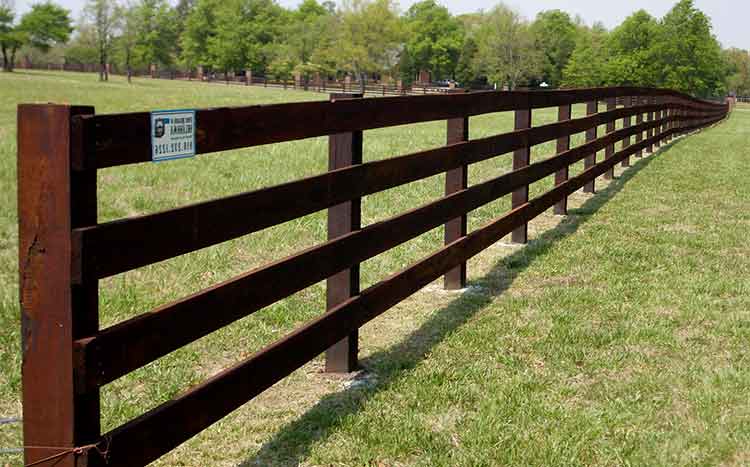
Non-Electric Wire
Non-electric wire fences are a relatively cheap option for those on a budget and looking for a standard fence to keep livestock enclosed. A non-electric wire fence will cost between $0.10 to $0.18 per line or $ to $7 per linear foot installed.
A non-electric wire fence is a perfect choice for ranchers who own large tracts of land, sometimes requiring several miles of fencing or several acres in size. By estimation based on current material and installation rates, it would cost between $1,256 to $5,756 in total to erect a wire fence around an acre of land.
Most people would install either a high-tensile standard wire fence or a non-tensile nonelectric fence, depending on their preferences and the fence’s purpose. Costs for both options are more or less the same. Expect many years of low maintenance service from a good quality non-electric wire fence.
Electric Wire
Electric wire fences are slightly more expensive than standard non-electric wire fences. However, they do add more security and are generally more effective at deterring wild animals, trespassers, and animals as well. Ranchers opt to install electrified fences for these additional benefits.
In terms of costs, a standard electric wire fence costs between $0.10 to $0.20 per linear foot installed. Expect to spend between $1850 to $6,550 in total to erect an electric fence on an acre of land. Costs to install and maintain an electric fence are also slightly higher than standard non-electric wire fences.
Vinyl
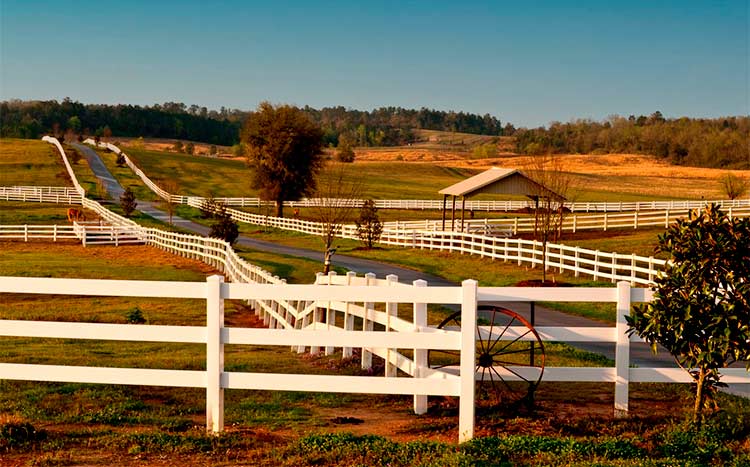
Vinyl ranch fences were not very common in the past especially in rural towns where there are reasonably large tracts of land to enclose. However, vinyl as a material has gained popularity in recent years becoming one of the most available products in the market.
A vinyl fence can be quite versatile as it can take the appearance of any other material like wood or even metal. It is also extremely durable being a manufactured product specifically formulated to withstand the elements. A standard vinyl fence can last for over five decades and requires little to no maintenance in that period.
In terms of costs, vinyl ranch fences cost between $7 to $20 per linear foot installed. It would roughly cost between $12,000 to $28,000 to install a vinyl ranch fence on an acre of land. Costs depend on the quality of the vinyl or composite installed, design of the fence, installation, and other factors.
Three-rail white vinyl fence
A three-rail white vinyl consists of pre-cut vinyl posts and interlocking rails. The rails easily lock into existing routed holes on the structural posts forming an elegant physical barrier.
Three rail white vinyl fences are very popular because they are easy to install, require little maintenance, and are also aesthetically pleasing. This type of fence is also perfect for keeping horses and other large animals in.
Expect to spend between $8 to $11 per linear foot on three rail white vinyl fences. You can also purchase the posts, rails, and caps separately although suppliers usually sell them as packages with pricing ranging between $3000- $3400 for a 256 feet 3-rail vinyl fence package. Such a package comes with 96 be-foot rails, 33 posts, and 33 caps.
Three Half Round Rails on Treated Posts
Half-round wooden fences are perfect for landowners looking for a sturdy, durable wooden fence that has a natural or traditional look. There are various designs you can go for depending on your needs with three half-round rails being the most common.
Three half-round rails on treated posts fences consist of a series of pressure-treated wooden posts connecting three horizontally nailed rails. The rails consist of treated half-round wood that is available in different sizes.
A standard 12 ft by 4in half round treated wood rail goes for about $8 to $ 10 depending on the supplier and type of wood. Expect to spend between $ 15 to $20 per foot on this type of fence depending on the type of wood and other factors.
Wood Fence with Wire
Wooden fences with wires are perfect for enclosing areas with small birds and animals such as chickens, dogs, and sheep. They offer medium security and are relatively inexpensive as compared to alternatives. Such fences can keep normal predators like foxes out while preventing your animals from wandering away.
A wood fence with wire consists of a series of wooden posts, a single rail at the top for reinforcement, and mesh wire covering the spaces between the posts. Installation is relatively easy but may be time-consuming. Costs for a wooden fence with wire installed range between $12 -$15 depending on the type of wood used.
Split Rail Vinyl
Split rail vinyl fences resemble traditional wooden posts and rail fences. Split rail vinyl fences are an ideal choice for landowners looking to enclose their land or mark their boundary with an aesthetically pleasing durable split rail fence.
Costs for split rail vinyl fences range between $10 to $25 per linear foot for materials only. Expect to spend at least $30 on average per square foot for split rail vinyl or composite fences installed.
Split Rail Wood
Instead of using vinyl, you can also opt to use wood for your split rail fence and save costs at the expense of longevity. A typical split rail wooden fence costs between $12- $28 installed depending on the type of wood used and installation costs.
Tape Fences
One of the least expensive options for a ranch fence, a tape fence can be used as a physical and psychological deterrent to livestock and wild animals. However, tape fences do not offer much in terms of security against human trespassers or large animals unless electrified.
In terms of cost, a standard tape fence could cost between $1 to $1.5 per linear foot installed. You can purchase a 1,300 feet roll of electrified tape for as little as $72 based on current rates. Tape fences are easy to install but they are not the best choice for long-term use and large areas.
Tape fences are perfect for small areas for specialized use such as separating livestock, creating grazing partitions to prevent overgrazing, and as a temporary physical and psychological deterrent. Choose more robust and durable materials like metal, vinyl, or wood for long-term ranch fencing.
What Is the Cheapest Ranch Fencing?
Non-electric wire fences are the most affordable and practical option for most ranches. The cost per linear foot for materials and installation is budget-friendly especially because normal ranch fences can cover large areas.
At the same time, there are several styles of and designs of wire fences to choose from. For instance, those on a very tight budget but with a need to enclose their land can use cheap barbed wire or normal wire fences that cost little per linear foot.
Other affordable options you can also consider include tape or PVC fences, softwood fences, mesh fences for smaller areas, and a mix of budget and premium fences for different sections of your fence. It is also possible that locally available materials like lumber may be cheaper and more suitable for you.
Tip: Go over your plans and budget with an experienced local fence installer before you decide on what sort of fence to erect on your ranch. In most cases, these guys have a better grasp of what is available in the local market and can help you choose the best value fence for your needs. As you may already know, going for the cheapest option does not always guarantee lower costs in the short and long term.
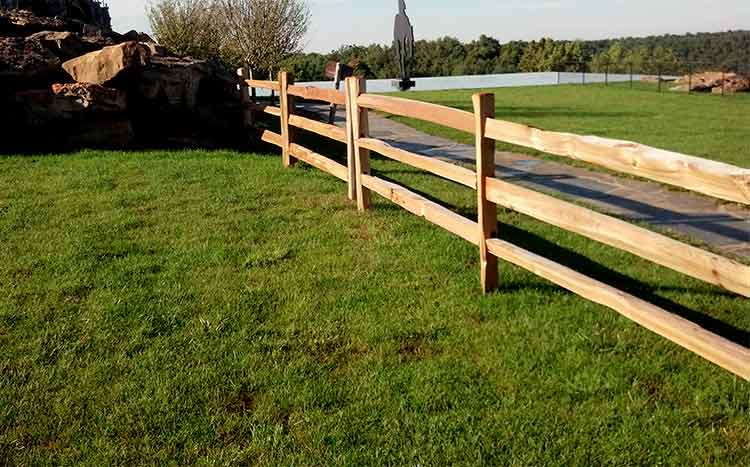
How Do I Estimate the Cost of Ranch Fencing?
There are some key things or factors that determine how much you will spend to erect a fence on your ranch. The quotes you receive for materials and installers will also be based on these factors.
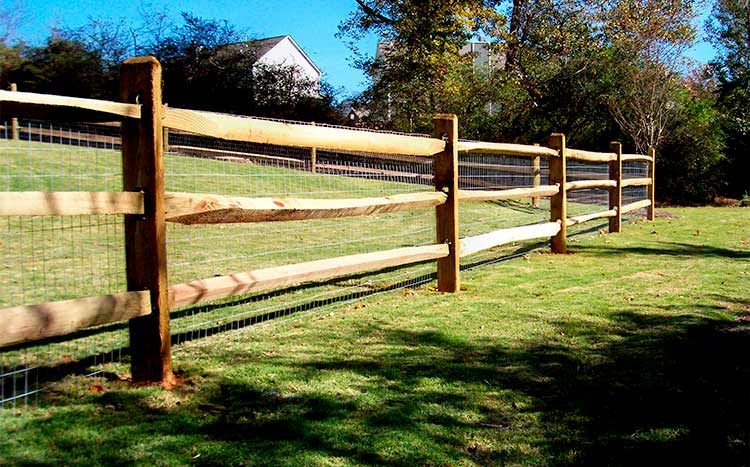
Size of The Area To Be Enclosed/Fenced
How big is your ranch or land to be fenced or which areas need to be fenced? Size is the biggest factor when estimating the cost of a fence and to a large extent the choice of fence to be installed. Some fences, though attractive, may not be practical to go for based on the size of your land.
As a rule of thumb, you should go for low-budget and low-maintenance ranch fencing if the area to be enclosed is more than an acre in size. You can then install more specialized fences for interior partitions if it is necessary to do so. As an example, most ranchers use affordable wire fences on the exterior or boundary line. They then install premium fences like wood or metal pipe for more specialized areas such as horse enclosures.
How Long Does Ranch Fencing Last?
A standard metal pipe ranch fence will last for more than seven decades or a lifetime depending on the type of the metal and the design of the fence. Vinyl ranch fences can last for fifteen years or more while wooden fences can last for ten years or more depending on the type of wood.
Some ranch fences are designed to be used for short periods and replaced frequently. For example, some wire or tape fences typically need replacement within a few years. There is nothing wrong with these fences as they are best used temporarily. The type of fence you choose depends on your needs and how long you want it to serve you.
DIY Vs Hiring A Professional
One of the key decisions you have to make as far as fence installation is concerned is whether you will install it yourself or have a professional do it for you. Of course, you will need to know what you are doing to DITY-install an entire ranch fence otherwise most people prefer to hire a pro.
Tip: Use the free search tool at the top of the page to find top-rated fence installers in your location. The tool is completely free to use and there is no obligation to hire any of the recommended installers.
Do It Yourself
Pros
- No upfront costs- You won’t have to pay someone to install the fence
- Flexible installation schedule- You can install the fence on your own time.
Cons
- Needs expertise- you need to know how to install the fence
- No warranties
- No insurance
- It may take longer depending on the number of people available to help with the installation
- Costly errors
- The quality of the installation cannot match that of a trained installer
Hiring a Professional
Pros
- Better quality installation
- Warranty on the installation
- Insured workers
- Professional installers have access to professional work tools
- Quicker installation
- Less work for you
- Less wastage
- Professional advice
Cons
- Upfront costs- Installation costs.
- You may hire unreliable installers
FAQ's
Fences do increase the value of a property and by a significant margin. You may get ROIs of up to 50% or more from installing a simple fence around your property. The type and quality of fence installed will determine how much value you will add to your property.
Popular alternatives to ranch fences include natural hedges and perimeter walls. Hedges can act as a physical and psychological barrier for animals and trespassers. Perimeter walls, though expensive to install, offer security and privacy.
Non-electric wire fences are generally easy to put up because of their simple design and lightweight materials. Professional installers can take less time to install more complex fences by using professional tools and their expertise.
